只接动名词的动词即词组教学提纲
完整版)只能接动名词doing的动词口诀
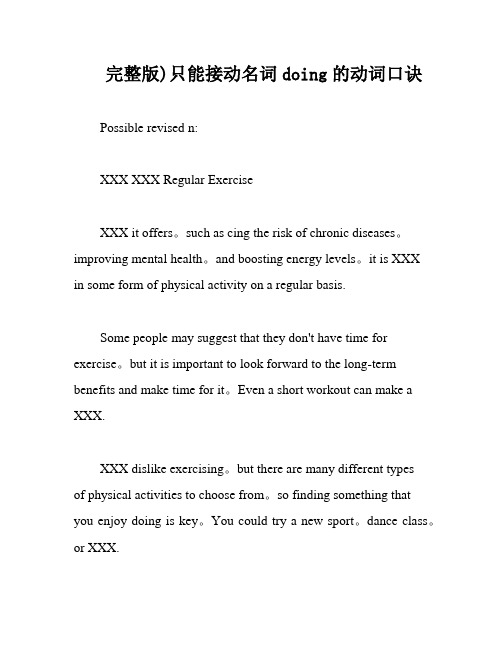
完整版)只能接动名词doing的动词口诀Possible revised n:XXX XXX Regular ExerciseXXX it offers。
such as cing the risk of chronic diseases。
improving mental health。
and boosting energy levels。
it is XXXin some form of physical activity on a regular basis.Some people may suggest that they don't have time for exercise。
but it is important to look forward to the long-term benefits and make time for it。
Even a short workout can make a XXX.XXX dislike exercising。
but there are many different typesof physical activities to choose from。
so finding something thatyou enjoy doing is key。
You could try a new sport。
dance class。
or XXX.XXX。
Once you get into the routine of regular exercise。
you may find that you actually miss it on days when you don't do it.XXX it regularly can also help prevent the risk of XXX as heart disease。
diabetes。
背口诀,告诉你哪些动词后面只能接动名词
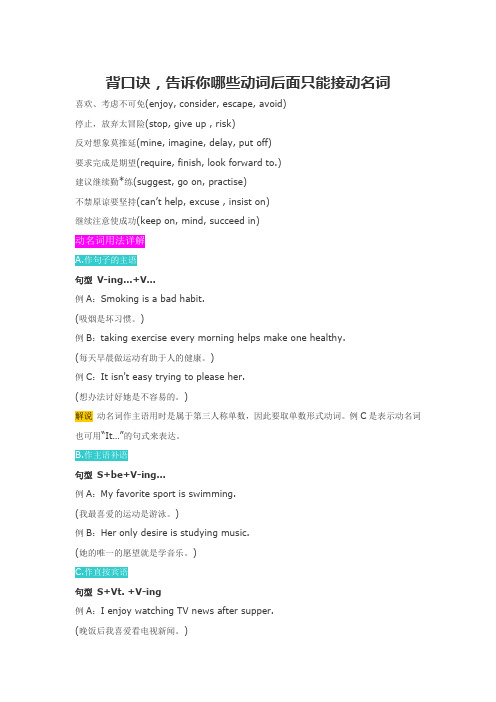
背口诀,告诉你哪些动词后面只能接动名词喜欢、考虑不可免(enjoy, consider, escape, avoid)停止,放弃太冒险(stop, give up , risk)反对想象莫推延(mine, imagine, delay, put off)要求完成是期望(require, finish, look forward to.)建议继续勤*练(suggest, go on, practise)不禁原谅要坚持(can’t help, excuse , insist on)继续注意使成功(keep on, mind, succeed in)句型V-ing…+V…例A:Smoking is a bad habit.(吸烟是坏习惯。
)例B:taking exercise every morning helps make one healthy.(每天早晨做运动有助于人的健康。
)例C:It isn't easy trying to please her.(想办法讨好她是不容易的。
)解说动名词作主语用时是属于第三人称单数,因此要取单数形式动词。
例C是表示动名词也可用“It…”的句式来表达。
句型S+be+V-ing…例A:My favorite sport is swimming.(我最喜爱的运动是游泳。
)例B:Her only desire is studying music.(她的唯一的愿望就是学音乐。
)句型S+Vt. +V-ing例A:I enjoy watching TV news after supper.(晚饭后我喜爱看电视新闻。
)例B:You'd better stop smoking.(你最好把烟戒掉了。
)例C:It began raining heavily when we got there.(我们到达那里时,开始下起大雨来了。
)例D:I remember seeing her somewhere before.(我记得以前在什么地方见过她。
只能跟动名词的动词

只能跟动名词的动词考虑建议盼原谅;承认推迟没得想。
避免错过继续练;否认完成就欣赏。
禁止想象才冒险;不禁介意准逃亡。
难以忍受始反对;想要成功坚持忙。
习惯放弃有困难;导致专心防道歉。
解析:第一句包含的动词有:consider, suggest/advise, look forward to, excuse/pardon,第二节包含的动词有:admit, delay/put off, fancy,第三句包含的动词有:avoid, miss, keep/keep on, practice,第四句句包含的动词有:deny, finish, enjoy/appreciate,第五句包含的动词有:forbid, imagine, risk第六句包含的动词有:can't help, mind, allow/permit, escape.第七句包含的动词有:can't stand(难以忍受),set about 开始,着手,object to,第八句包含动词有:feel like(想要),succeed in (成功),stick to(坚持) ,insist on(坚持,强调,坚决要求),be busy (in)(忙于做某事)第九句包含的动词有:be used/accustomed to(习惯于……),give up(放弃), have difficulty/trouble (in), (做某事有困难)第十句包含的动词有:lead to(导致), devote to(将…奉献给;把…专用于), prevent……from……(预防,防止),apologize for(为……道歉), ,此外,have a good/wonderful/hard time (in), spend time (in),thank you for, pay attention to, aim at 目的在于,旨在;瞄准;企图,accuse…of…控告;谴责,get down to(着手某事),allow,undesrtand,resist(抵制、抵抗),It's no use doing sth, there is no point (in)doing sth.etc.注意:(1).advise, allow, consider后面不可以接不定式,但可以接不定式做宾语补足语,即:advise/allow/consider sb. to do sth. 建议/允许/考虑某人做某事。
高中英语家教备课资料 高中英语基础语法第九课:动词 6动名词
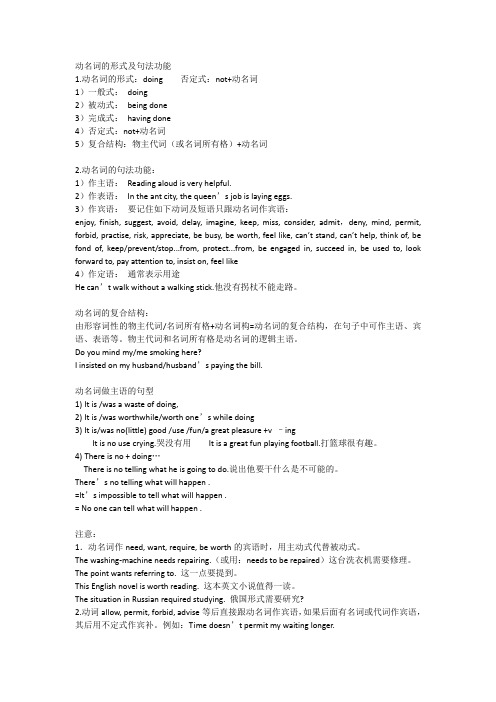
动名词的形式及句法功能1.动名词的形式:doing 否定式:not+动名词1)一般式:doing2)被动式:being done3)完成式:having done4)否定式:not+动名词5)复合结构:物主代词(或名词所有格)+动名词2.动名词的句法功能:1)作主语:Reading aloud is very helpful.2)作表语:In the ant city, the queen’s job is laying eggs.3)作宾语:要记住如下动词及短语只跟动名词作宾语:enjoy, finish, suggest, avoid, delay, imagine, keep, miss, consider, admit,deny, mind, permit, forbid, practise, risk, appreciate, be busy, be worth, feel like, can’t stand, can’t help, think of, be fond of, keep/prevent/stop...from, protect...from, be engaged in, succeed in, be used to, look forward to, pay attention to, insist on, feel like4)作定语:通常表示用途He can’t walk without a walking stick.他没有拐杖不能走路。
动名词的复合结构:由形容词性的物主代词/名词所有格+动名词构=动名词的复合结构,在句子中可作主语、宾语、表语等。
物主代词和名词所有格是动名词的逻辑主语。
Do you mind my/me smoking here?I insisted on my husband/husband’s paying the bill.动名词做主语的句型1)It is /was a waste of doing,2)It is /was worthwhile/worth one’s while doing3)It is/was no(little) good /use /fun/a great pleasure +v –ingIt is no use crying.哭没有用It is a great fun playing football.打篮球很有趣。
动名词教案
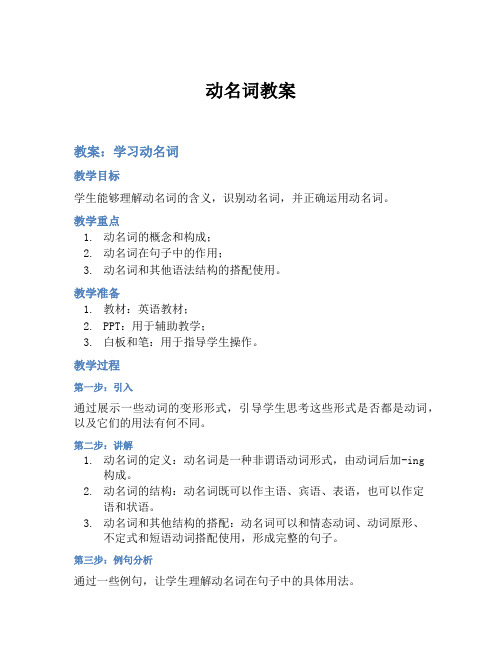
动名词教案教案:学习动名词教学目标学生能够理解动名词的含义,识别动名词,并正确运用动名词。
教学重点1.动名词的概念和构成;2.动名词在句子中的作用;3.动名词和其他语法结构的搭配使用。
教学准备1.教材:英语教材;2.PPT:用于辅助教学;3.白板和笔:用于指导学生操作。
教学过程第一步:引入通过展示一些动词的变形形式,引导学生思考这些形式是否都是动词,以及它们的用法有何不同。
第二步:讲解1.动名词的定义:动名词是一种非谓语动词形式,由动词后加-ing构成。
2.动名词的结构:动名词既可以作主语、宾语、表语,也可以作定语和状语。
3.动名词和其他结构的搭配:动名词可以和情态动词、动词原形、不定式和短语动词搭配使用,形成完整的句子。
第三步:例句分析通过一些例句,让学生理解动名词在句子中的具体用法。
第四步:练习在课堂上布置动名词的相关练习,让学生巩固和运用所学的知识。
总结通过本节课的学习,学生了解了动名词的基本概念和用法,并能够正确使用动名词。
同时,还激发了学生学习英语语法的热情和兴趣。
扩展为了帮助学生更深入地理解动名词的用法和作用,可以提供以下扩展教学内容:1.动名词的变形:不仅仅是加上-ing,还可以在词尾加上-e,以及在辅音字母后面双写辅音字母再加上-ing,例如:come →coming, hope → hoping, swim → swimming2.动名词的意义:动名词除了表现动作的意义外,还可以表示一种状态或行为,例如:I enjoy reading.(我喜欢阅读。
)Shesuggested going to the cinema.(她建议去看电影。
)3.动名词的替换:有时候动名词可以被一个名词或代词替换,例如:Hiking is fun.(徒步旅游很有趣。
)→ It is fun to hike.(徒步旅游很有趣。
)参考资料1.《牛津高一英语》2.《牛津英语语法》。
动名词(教案)

教学过程一、复习预习教师引导学生复习上节内容,并引入本节课程内容二、知识讲解考点/易错点1动名词作主语1)直接位于句首做主语。
例如:Swimming is a good sport in summer.2)用 it 作形式主语,把动名词(真实主语)置于句尾作后置主语。
动名词做主语时,不太常用 it 作先行主语,多见于某些形容词及名词之后。
如:It is no use telling him not to worry.3)动名词作主语与动词不定式作主语的比较:动词不定式和动名词都可以用作主语。
在意义上相近。
但动名词多用来表示泛指或抽象动作,不定式多用来表示特指或具体动作。
比较:Smoking is not good for health. It is not good for you to smoke so much.考点/易错点2动名词作表语动名词作表语时句子主语常是表示无生命的事物的名词或what引导的名词性从句。
表语动名词与主语通常是对等的关系,表示主语的内容,主语、表语可互换位置。
如:Your task is cleaning the windows. 你的任务就是擦窗户。
(Cleaning the windows is your task.)What I hate most is being laughed at. 我最痛恨的就是被别人嘲笑。
(Being laughed at is what I hate most.)wish + 宾语从句”表示过去不能实现的愿望,从句中的谓语动词用“had + 过去分词”如:I wish I had known the answer.考点/易错点3动名词作定语动名词作定语往往表示被修饰词的某种用途。
如:a washing machine=a machine for washing=a machine which is used for washing .考点/易错点4动名词作宾语如:We are thinking of making a new plan for the next term. 我们正考虑为下学期制定新的计划。
英语中有些动词后面跟动词时

一、动名词1. 英语中有些动词后面跟动词时,只能跟动名词而不能接不定式,这些动词有:admit,acknowledge 承认appreciate 感激,赞赏; consider,考虑avoid 避免complete 完成consider 认为delay 耽误deny 否认detest 讨厌endure 忍受enjoy 喜欢escape 逃脱prevent阻止fancy 想象finish 完成imagine 想象mind 介意 miss(错过) miss 想念postpone 推迟practise 训练recall 回忆resent 讨厌resist 抵抗resume 继续risk 冒险suggest 建议face 面对include 包括stand 忍受understand 理解forgive 宽恕keep 继续例如:Would you mind turning down your radio a little, please?The squirrel was lucky that it just missed being caught.Have you considered going abroad for your education?They don’t want to risk losing their lives.一些动词词组后也只能接动名词:feel like,admit to,prefer…to,be(get) used to, be accustomed to,lead to,devote oneself to,object to,stick to,contribute to, pay attention to,look forward to(to为介词) It's worth…,as well as, be busy, can't help, It's no use /good,be tired of, be fond of, be capable of,be afraid of, be proud of, think of / about,hold off, put off, keep on,insist on, count on / upon, set about, be successful in, succeed in,be good at, take up,give up, burst out, prevent … from…,He is used to living in the countryside.It’s no use talking too much.The joke is so funny that I can’t help laughing.I am tired of working here.2. worth的用法worth,worthy,worth-while 都为形容词。
初中只能接动名词的动词顺口溜大全
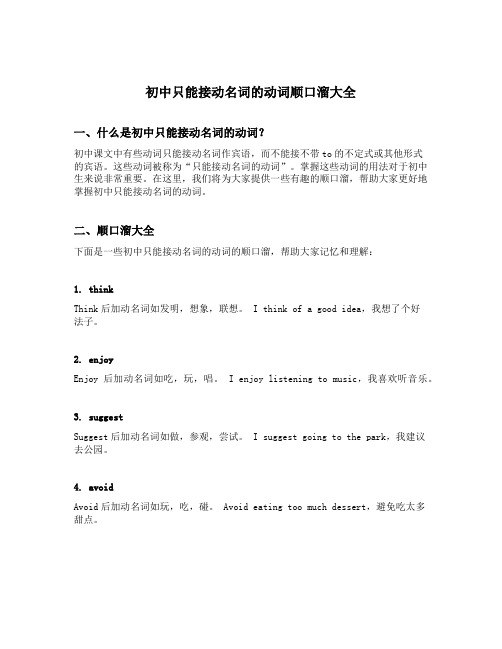
初中只能接动名词的动词顺口溜大全一、什么是初中只能接动名词的动词?初中课文中有些动词只能接动名词作宾语,而不能接不带to的不定式或其他形式的宾语。
这些动词被称为“只能接动名词的动词”。
掌握这些动词的用法对于初中生来说非常重要。
在这里,我们将为大家提供一些有趣的顺口溜,帮助大家更好地掌握初中只能接动名词的动词。
二、顺口溜大全下面是一些初中只能接动名词的动词的顺口溜,帮助大家记忆和理解:1. thinkThink后加动名词如发明,想象,联想。
I think of a good idea,我想了个好法子。
2. enjoyEnjoy后加动名词如吃,玩,唱。
I enjoy listening to music,我喜欢听音乐。
3. suggestSuggest后加动名词如做,参观,尝试。
I suggest going to the park,我建议去公园。
4. avoidAvoid后加动名词如玩,吃,碰。
Avoid eating too much dessert,避免吃太多甜点。
5. appreciateAppreciate后加动名词如您,你,他。
I appreciate your help,我感谢你的帮助。
6. admitAdmit后加动名词如犯错误,看电影,学英语。
He admitted making a mistake,他承认犯了一个错误。
7. denyDeny后加动名词如偷窃,谎言,问题。
He denied stealing the money,他否认偷了钱。
8. avoidAvoid后加动名词如玩,吃,碰。
Avoid eating too much dessert,避免吃太多甜点。
9. considerConsider后加动名词如去外地,转行,换工作。
I’m considering changing my job,我在考虑换工作。
10. finishFinish后加动名词如作业,洗碗,吃饭。
英语语法顺口溜:哪些动词后面只能接动名词背诵口诀

英语语法顺口溜:哪些动词后面只能接动名词背诵口诀哪些动词后面只能接动名词,下面的顺口溜有助于记忆喜欢、考虑不可免(enjoy, consider, escape, avoid)停止,放弃太冒险(stop, give up , risk)反对想象莫推延(mine, imagine, delay, put off)要求完成是期望(require, finish, look forward to.)建议继续勤*练(suggest, go on, practise)不禁原谅要坚持(can’t help, excuse , insist on)继续注意使成功(keep on, mind, succeed in)------------------------------动名词用法详解补充:A.作句子的主语句型 V-ing…+V…例A:Smoking is a bad habit.(吸烟是坏习惯。
)例B:taking exercise every morning helps make one healthy.(每天早晨做运动有助于人的健康。
)例C:It isn't easy trying to please her.(想办法讨好她是不容易的。
)解说动名词作主语用时是属于第三人称单数,所以要取单数形式动词。
例C是表示动名词也可用“It…”的句式来表达。
B.作主语补语句型 S+be+V-ing…例A:My favorite sport is swimming.(我最喜爱的运动是游泳。
)例B:Her only desire is studying music.(她的的愿望就是学音乐。
)C.作直按宾语句型 S+Vt. +V-ing例A:I enjoy watching TV news after supper.(晚饭后我喜爱看电视新闻。
)例B:You'd better stop smoking.(你把烟戒掉了。
接动名词的动词
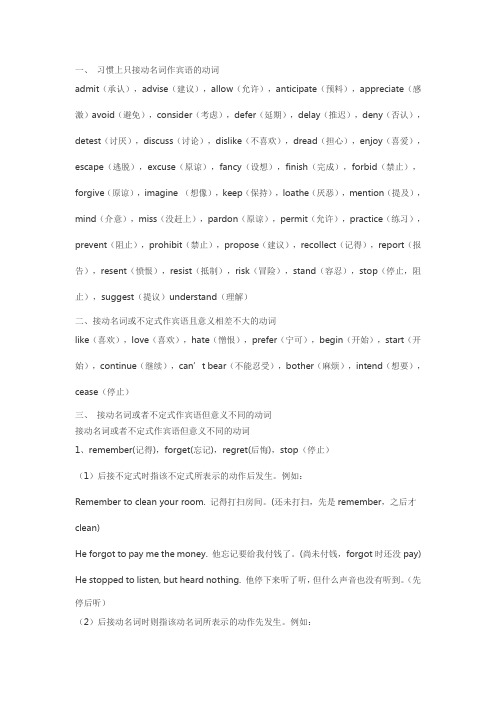
一、习惯上只接动名词作宾语的动词admit(承认),advise(建议),allow(允许),anticipate(预料),appreciate(感激)avoid (避免),consider(考虑),defer(延期),delay(推迟),deny(否认),detest(讨厌),discuss(讨论),dislike(不喜欢),dread(担心),enjoy(喜爱),escape(逃脱),excuse (原谅),fancy(设想),finish(完成),forbid(禁止),forgive(原谅),imagine (想像),keep(保持),loathe(厌恶),mention(提及),mind(介意),miss(没赶上),pardon(原谅),permit(允许),practice(练习),prevent(阻止),prohibit(禁止),propose(建议),recollect(记得),report(报告),resent(愤恨),resist(抵制),risk (冒险),stand(容忍),stop(停止,阻止),suggest(提议)understand(理解)二、接动名词或不定式作宾语且意义相差不大的动词like(喜欢),love(喜欢),hate(憎恨),prefer(宁可),begin(开始),start(开始),continue(继续),can’t bear(不能忍受),bother(麻烦),intend(想要),cease(停止)三、接动名词或者不定式作宾语但意义不同的动词接动名词或者不定式作宾语但意义不同的动词1、remember(记得),forget(忘记),regret(后悔),stop(停止)(1)后接不定式时指该不定式所表示的动作后发生。
例如:Remember to clean your room. 记得打扫房间。
(还未打扫,先是remember,之后才clean) He forgot to pay me the money. 他忘记要给我付钱了。
动词后面只能接动名词的初中常考14个
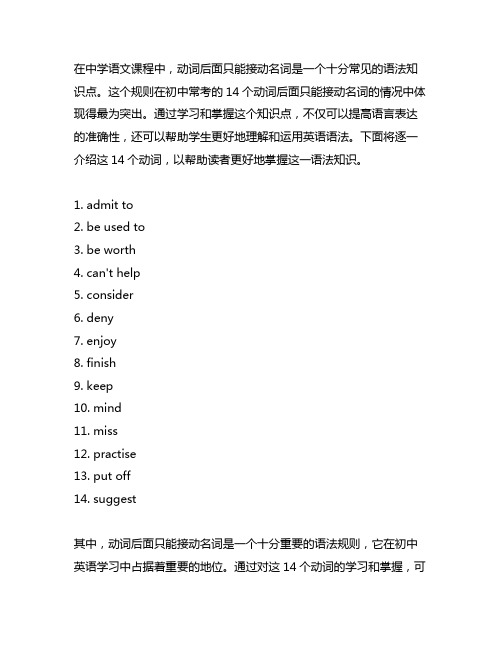
在中学语文课程中,动词后面只能接动名词是一个十分常见的语法知识点。
这个规则在初中常考的14个动词后面只能接动名词的情况中体现得最为突出。
通过学习和掌握这个知识点,不仅可以提高语言表达的准确性,还可以帮助学生更好地理解和运用英语语法。
下面将逐一介绍这14个动词,以帮助读者更好地掌握这一语法知识。
1. admit to2. be used to3. be worth4. can't help5. consider6. deny7. enjoy8. finish9. keep10. mind11. miss12. practise13. put off14. suggest其中,动词后面只能接动名词是一个十分重要的语法规则,它在初中英语学习中占据着重要的地位。
通过对这14个动词的学习和掌握,可以帮助学生更好地运用这一语法知识,提高语言表达的准确性和流利度。
对于中文母语的学生来说,这些动词后面只能接动名词的情况也常常与中文的表达方式不同,需要花费一些时间去适应和掌握。
在学习动词后面只能接动名词的情况时,我们需要注重在实际语境中的运用。
通过大量的练习和反复的操练,可以帮助学生更好地掌握这一语法知识。
老师在教学中也可以通过丰富多样的教学活动和游戏,来帮助学生更好地理解和运用这一知识点。
动词后面只能接动名词的初中常考14个动词,是一个学习英语语法时需要重点掌握的知识点。
通过对这些动词的学习和练习,可以帮助学生提高语言表达的准确性和流利度,更好地理解和运用这一语法规则。
对于中文母语的学生来说,需要花费一定的时间去适应和掌握这一规则,但通过持之以恒的努力,一定能够取得显著的进步。
希望通过本文的介绍和分析,读者能够更深入地理解和掌握这一知识点,从而在英语学习中取得更大的进步。
也希望能够激发读者对英语学习的兴趣,让英语学习成为一件有趣并且有意义的事情。
在学习动词后面只能接动名词的情况时,我们需要注重实际语境中的运用。
初中英语只接动名词作宾语的常用动词及英语学习方法
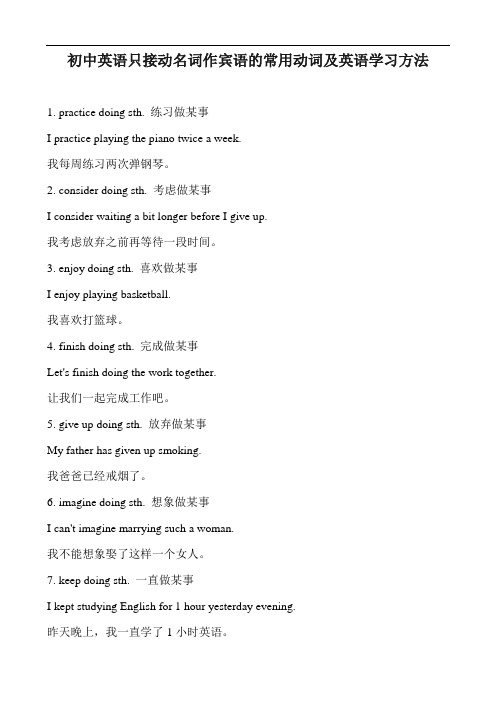
初中英语只接动名词作宾语的常用动词及英语学习方法1. practice doing sth. 练习做某事I practice playing the piano twice a week.我每周练习两次弹钢琴。
2. consider doing sth. 考虑做某事I consider waiting a bit longer before I give up.我考虑放弃之前再等待一段时间。
3. enjoy doing sth. 喜欢做某事I enjoy playing basketball.我喜欢打篮球。
4. finish doing sth. 完成做某事Let's finish doing the work together.让我们一起完成工作吧。
5. give up doing sth. 放弃做某事My father has given up smoking.我爸爸已经戒烟了。
6. imagine doing sth. 想象做某事I can't imagine marrying such a woman.我不能想象娶了这样一个女人。
7. keep doing sth. 一直做某事I kept studying English for 1 hour yesterday evening.昨天晚上,我一直学了1小时英语。
8. put off doing sth. 推迟做某事Sometimes students put off doing their homework until the last minute. 有时学生们会拖延到最后一分钟才做作业。
9. risk doing sth. 冒险做某事To win the gamble,he risked losing 100 dollars.为了赢这场赌局,他冒了失去100美元的风险。
10. suggest doing sth. 建议做某事I suggest traveling abroad next month.我建议下个月出国旅行。
只能接动名词doing的动词口诀

deny否认
complete完成finish完成
cease停止quit放弃停止
appreciate[ə'priʃɪet]感激欣赏
禁止想象才冒险,
forbid禁止prevent阻止
imagine设想
risk冒险
不禁介意弃逃亡。
can’t help不禁,情不自禁
mind介意
escape逃跑逃避
1.allowdoing sth.允许做某事
2.discussdoing sth.讨论做某事
3.dislikedoing sth.不喜欢做某事
4.enjoydoing sth.喜爱做某事
5.excusedoing sth.原谅做某事
6.give updoing sth.放弃做某事
7.mentiondoing sth.提及做某事
词只能接动名词doing的动词口诀口诀单词考虑建议盼原谅consider考虑suggest建议advocate??dv?ke?t提倡主张lookforwardto盼望forgive原谅pardon原谅承认推迟没得想
只能接动名词doing的动词口诀
口诀
单词
考虑建议盼原谅,
consider考虑
suggest建议advocate[ˈædvəkeɪt]提倡主张
look forward to盼望
forgive原谅pardon原谅
承认推迟没得想。
acknowledge承认admit承认
postpone延迟延期delay延迟defer拖延put off推迟
recall回想fancy幻想爱好
避免错过继续练,
avoid避免
miss错过
keep保持practise练 Nhomakorabea实践8.permitdoing sth.允许做某事
只能接动名词做宾语的动词教学教材

只能接动名词做宾语的动词只接动名词(不能接不定式)作宾语的28个常用动词动词的固定搭配是考试中经常出现的内容。
动词后到底是接不等式(to do)还是接动名词(doing)作宾语,很多同学大概都搞不清楚!今天,小简老师给大家梳理了只接动名词(不能接不定式)作宾语的28个常用动词,大家用心记下来,相信会有很大帮助的!1. practice doing sth. 练习做某事I practice playing the piano twice a week.我每周练习两次弹钢琴。
2. consider doing sth. 考虑做某事I consider waiting a bit longer before I give up.我考虑放弃之前再等待一段时间。
3. enjoy doing sth. 喜欢做某事I enjoy playing basketball.我喜欢打篮球。
4. finish doing sth. 完成做某事Let's finish doing the work together.让我们一起完成工作吧。
5. give up doing sth. 放弃做某事My father has given up smoking.我爸爸已经戒烟了。
6. imagine doing sth. 想象做某事I can't imagine marrying such a woman.我不能想象娶了这样一个女人。
7. keep doing sth. 一直做某事I kept studying English for 1 hour yesterday evening.昨天晚上,我一直学了1小时英语。
8. put off doing sth. 推迟做某事Sometimes students put off doing their homework until the last minute. 有时学生们会拖延到最后一分钟才做作业。
只接动名词的动词即词组
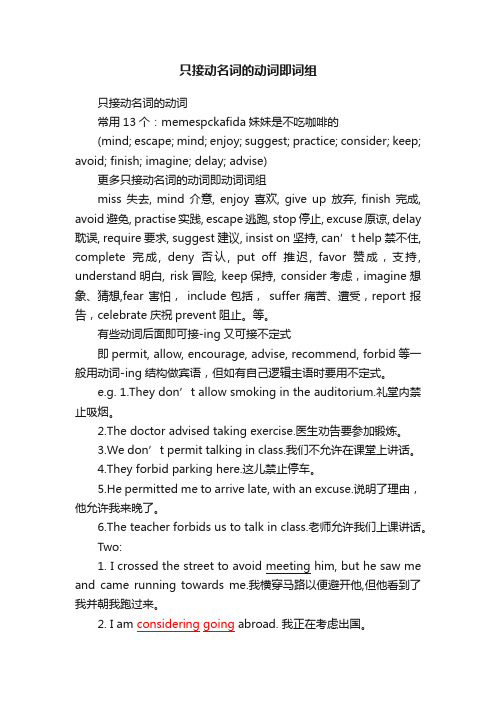
只接动名词的动词即词组只接动名词的动词常用13个:memespckafida妹妹是不吃咖啡的(mind; escape; mind; enjoy; suggest; practice; consider; keep; avoid; finish; imagine; delay; advise)更多只接动名词的动词即动词词组miss失去, mind介意, enjoy喜欢, give up放弃, finish完成, avoid避免, practise实践, escape逃跑, stop停止, excuse原谅, delay 耽误, require要求, suggest建议, insist on坚持, can’t help禁不住, complete完成, deny否认, put off推迟, favor赞成,支持, understand明白, risk冒险, keep保持, consider考虑,imagine想象、猜想,fear 害怕,include包括,suffer痛苦、遭受,report报告,celebrate庆祝prevent阻止。
等。
有些动词后面即可接-ing又可接不定式即permit, allow, encourage, advise, recommend, forbid等一般用动词-ing结构做宾语,但如有自己逻辑主语时要用不定式。
e.g. 1.They don’t allow smoking in the auditorium.礼堂内禁止吸烟。
2.The doctor advised taking exercise.医生劝告要参加锻炼。
3.We don’t permit talking in class.我们不允许在课堂上讲话。
4.They forbid parking here.这儿禁止停车。
5.He permitted me to arrive late, with an excuse.说明了理由,他允许我来晚了。
只能接ing教案

只能接-ing形式的35动词和短语一、用法归纳有的动词或短语动词后只能用动名词而不能接不定式。
如allow,permit(允许), consider(考虑), suggest, advice(建议),oman'">), suggest, advice(反复; 不停), finish(完成), imagine(想象), practise(练习),understand(明白), appreciate, enjoy(喜欢), miss(错过; 怀念), prevent(阻止), forbid(禁止), escape(避免), include(包括), forgive, pardon, excuse(原谅), dislike(厌恶), discuss(讨论), report(报道), admit(承认), mind(介意),risk(冒险), can’t stand(不能忍受), burst out(突然开始), feel like(想要),insist on(坚持), delay, put off(推迟), give up(放弃), be busy(忙于), beworth(值得)等。
记忆口诀:喜欢、考虑不可免(enjoy, consider, escape, avoid)停止,放弃太冒险(stop, give up , risk)反对想象莫推延(mine, imagine, delay, put off)要求完成是期望(require, finish, look forward to.)建议继续勤*练(suggest, go on, practise)不禁原谅要坚持(can’t help, excuse , insist on)继续注意使成功(keep on, mind, succeed in)二、考题分析1. Do you mind ________ alone at home? (上海卷)A. Jane leavingB. Jane having leftC. Jane’s being leftD. Jane to be left【分析】答案选C。
动词ing形式(动名词)的形式及用法
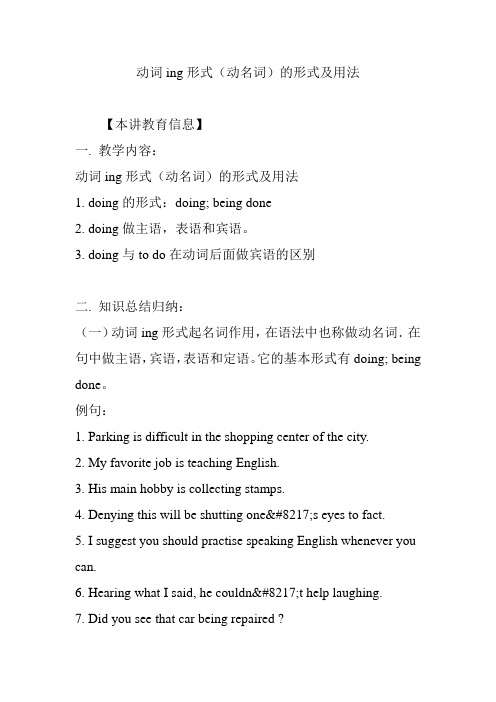
动词ing形式(动名词)的形式及用法【本讲教育信息】一. 教学内容:动词ing形式(动名词)的形式及用法1. doing的形式:doing; being done2. doing做主语,表语和宾语。
3. doing与to do在动词后面做宾语的区别二. 知识总结归纳:(一)动词ing形式起名词作用,在语法中也称做动名词.在句中做主语,宾语,表语和定语。
它的基本形式有doing; being done。
例句:1. Parking is difficult in the shopping center of the city.2. My favorite job is teaching English.3. His main hobby is collecting stamps.4. Denying this will be shutting one’s eyes to fact.5. I suggest you should practise speaking English whenever you can.6. Hearing what I said, he couldn’t help laughing.7. Did you see that car being repaired ?注:to do形式也可以做主语或表语。
一般情况下,这两种形式做主语或表语,差别不是很大。
但是如果刻意强调某个具体的动作,就用to do 形式,而要表示一般性或泛指的动作则用doing形式。
例如:1. It is difficult to park in the shopping center at the weekend.2. My duty is to take care of the baby while she is out.(二)在一些动词后面只能接动名词做宾语。
后面跟doing 做宾语的常见动词有:admit; advise; appreciate; avoid; complete; consider; deny; mention; mind; miss; prevent; delay; enjoy; escape; imagine; postpone; practise; risk; suggest;常见的动名词短语,如:be worth doing; can’t help doing; look forward to doing; go on doing; insist on doing; prefer doing to doing; be busy doing; keep on doing; devote…to doing; spend…in doing; have difficulty in doing; have a good time doing; prevent…from doing1. I am looking forward to hearing from you soon.2. He has devoted himself to protecting the wildlife.3. He is trying to avoid answering my question.4. The accused man denied ever having met her.5. He insisted on sending for doctor at once.6. The film is well worth seeing.7. You can’t imagine the difficulty we had making a little money.(三)doing形式的逻辑主语:当强调doing所表达的动作的执行者(逻辑主语)时,需要在doing前面加上物主代词,人称代词宾格,名词所有格或不定代词例句:1. I’m surprised at your/you doing it.2. She insisted on their both accepting the invitation.3. Do you mind my opening the window ?4. Your being right doesn’t necessarily mean my being wrong.5. The children are looking forward to spring coming.6. He disapproved of that being said about Jane.7. Mr. Carson complained about Tom and Mary coming to class late.(四)doing与to do在动词后面做宾语的区别: remember/forget to do:记住/忘记了去做某事Don’t forget to do sth.=remember to do sth.regret to do: 遗憾地去做/说regretdoing: 后悔做了某事mean to do= want to do mean doing 意味着做stop to do: 停下来去做stop doing 停止/不去做try to do: 试图/努力/企图去做try doing: 尝试用一种方法做go on to do 接着去做另一件事go on doing: 继续把事情做下去例句:1. Don’t forget to mail this letter tomorrow morning.2. I don’t remember having said anything of the sort.3. I regret to say that you have failed in the exam.4. He tried to walk without a crutch.5. He went on to tell us about the accident.【典型例题】一. 单项选择:1. While shopping, people sometimes can’t help ____ into buy something they don’t really need.A. to persuadeB. persuadingC. being persuadedD. be persuaded分析:题意为:进店购物,人们有时不得不被购买不想买的东西。
- 1、下载文档前请自行甄别文档内容的完整性,平台不提供额外的编辑、内容补充、找答案等附加服务。
- 2、"仅部分预览"的文档,不可在线预览部分如存在完整性等问题,可反馈申请退款(可完整预览的文档不适用该条件!)。
- 3、如文档侵犯您的权益,请联系客服反馈,我们会尽快为您处理(人工客服工作时间:9:00-18:30)。
只接动名词的动词即词组只接动名词的动词常用13个:memespckafida妹妹是不吃咖啡的(mind; escape; mind; enjoy; suggest; practice; consider; keep; avoid; finish; imagine; delay; advise)更多只接动名词的动词即动词词组miss失去, mind介意, enjoy喜欢, give up放弃, finish完成, avoid避免, practise实践, escape 逃跑, stop停止, excuse原谅, delay耽误, require要求, suggest建议, insist on坚持, can’t help 禁不住, complete完成, deny否认, put off推迟, favor赞成,支持, understand明白, risk冒险, keep保持, consider考虑,imagine想象、猜想,fear 害怕,include包括,suffer痛苦、遭受,report报告,celebrate庆祝prevent阻止。
等。
有些动词后面即可接-ing又可接不定式即permit, allow, encourage, advise, recommend, forbid等一般用动词-ing结构做宾语,但如有自己逻辑主语时要用不定式。
e.g. 1.They don’t allow smoking in the auditorium.礼堂内禁止吸烟。
2.The doctor advised taking exercise.医生劝告要参加锻炼。
3.We don’t permit talking in class.我们不允许在课堂上讲话。
4.They forbid parking here.这儿禁止停车。
5.He permitted me to arrive late, with an excuse.说明了理由,他允许我来晚了。
6.The teacher forbids us to talk in class.老师允许我们上课讲话。
Two:1. I crossed the street to avoid meeting him, but he saw me and came running towards me.我横穿马路以便避开他,但他看到了我并朝我跑过来。
2. I am considering going abroad. 我正在考虑出国。
3. I am sorry I missed seeing you while you especially visited me to my home.真对不起,你专程来我家拜访机时我却不在。
4. Carlos just missed being caught.卡罗斯恰好没被抓住。
5. You certainly mustn’t miss seeing this wonderful film.你当然不应错过这个精彩的电影。
6. It’s a pity that I missed listening to the report.真遗憾我没听到那个报告。
7. Would you mind my opening the window?我打开窗子你介意吗?8. He didn’t mind being made fun of.别人拿他取笑他不在乎。
9. I don’t mind traveling by bus, but I hate to stand (standing) in queues.乘公共汽车旅行也可,只是我不愿排队。
10. We don’t mind his explaining the problem again.我们不在意他又把那问题解释了一遍。
11. I have enjoyed talking to you about old times.我很高兴曾和你叙旧。
精品资料12. I enjoy going for a walk after supper.我特别愿意晚饭后去散步。
13. You’d better give up smoking.你最好戒烟。
14. I want to give up working on the novel.我不想写这部小说了。
15. Have you finished correcting the students’ papers?人批改完学生的论文了吗?16. I haven’t finished doing the exercise.这个练习我还没有做完。
17. She practices speaking English every day.她每天都练习说英语。
18. Practise putting the tip of your tongue between your teeth.练习把舌尖入在牙齿之间。
19. The enemy will never escape our watching off.敌人永远逃不脱我们的监视。
20. He couldn’t escape answering his wife’s question.他不得不回答他妻子的问题。
21. Please excuse my being late today.请原谅我今天迟到了。
22. Excuse my interrupting you so rudely.请原谅我这样无礼地打断你。
23. You mustn’t delay asking for the teacher over.你一定不要耽搁请那位老师来。
24. I delayed answering you owing to the pressure of the work.由于工作的压力,我耽搁了答复你。
25. The floor requires washing.地板需要擦洗。
26. Does your watch want repairing?你表要修吗?27. The monitor suggested our having a picnic in Qian Shan Mountain.班长建议我们到千山野餐。
28. He suggested calling a meeting and letting the workers decide the matter themselves. 他建议召开一次会议,让工人们自己解决这件事。
29. I suggested bringing the meeting to an end.我建议会议就开到这吧。
30. I insisted on his going.我坚持他去。
31. He insisted on going with me.他坚持与我同去。
32. She could not help weeping when she heard the sad news that her mother died.当她听到妈妈逝世的消息时,她禁不住哭了起来。
33. I can’t help thinking he’s still alive.我情不自禁地想着,他还活着。
34. All the students of English Department have completed studying all subjects.英语系所有的学生已经学完全部科目。
35. We must risk catching cold in a storm.我们得冒赶冒之险。
36. I can’t help wondering whether we should risk going without raincoats.我真不敢想,我们将在无雨具的情况下,冒雨前往。
37. News of successes keeps pouring in.捷报频传。
38. It kept raining the whole day yesterday.昨天,雨不停地下了一天。
39. I dislike getting up early.我不喜欢早起。
精品资料40. I dislike being looked at while attempting to learn skating.学滑冰时,我讨厌别人看我。
41. He was considering going to Beijing.他在考虑去北京的事。
42. We are considering making a plan for study.我们正考虑制定一份学习计划。
43. I couldn’t imagine that being possible.我想那是不可能的。
44. I can’t imagine him knowing all that.我真猜不出他是怎么知道这一切的。
45. He denied knowing anything about (denied any knowledge of) their plans.他否认知道他们的计划。
46. I forgive you for being rude.我原谅你的卤莽。
47. Please forgive me for being late. 请原谅我来晚了。
48. Begged the host's pardon for leaving early.请求主人原谅提前离去49. Pardon me for interrupting (you).对不起打扰(你)了。
50. She could hardly resist laughing。
她真忍不住要笑。
51. Postpone sending an answer.暂缓答复。
52. Fancy meeting you here!想不到在这儿见到你了!53. Fancy James winning the competition! 真想不到詹姆斯比赛赢了!54. Fancy having a fool like that for a husband!试想找了这么一个傻瓜做丈夫!55. I cannot understand his robbing his friend ( why he robbed his friend).我不明白他为何抢劫他的朋友。
不定式:不定式表示发生在谓语动词发生之后;动词不定式一般与句子的主语,宾语或结构中的借此宾语有逻辑上的主谓关系。
不定式的形式:to do sth. ; to have done sth; to be done; to have been doing;We agreed to meet here but so far she hasn’t turned up yet.I don’t want to have sound like I’m speaking ill of anybody; but the manager’s plan is unfair.It was unbelievable that the fans waited outside the gym for three hours just to have a look at the sports stars.He hurried to the station only to find that the train had left.Only to do 表示事与愿违的结果,未曾料想的结果。
